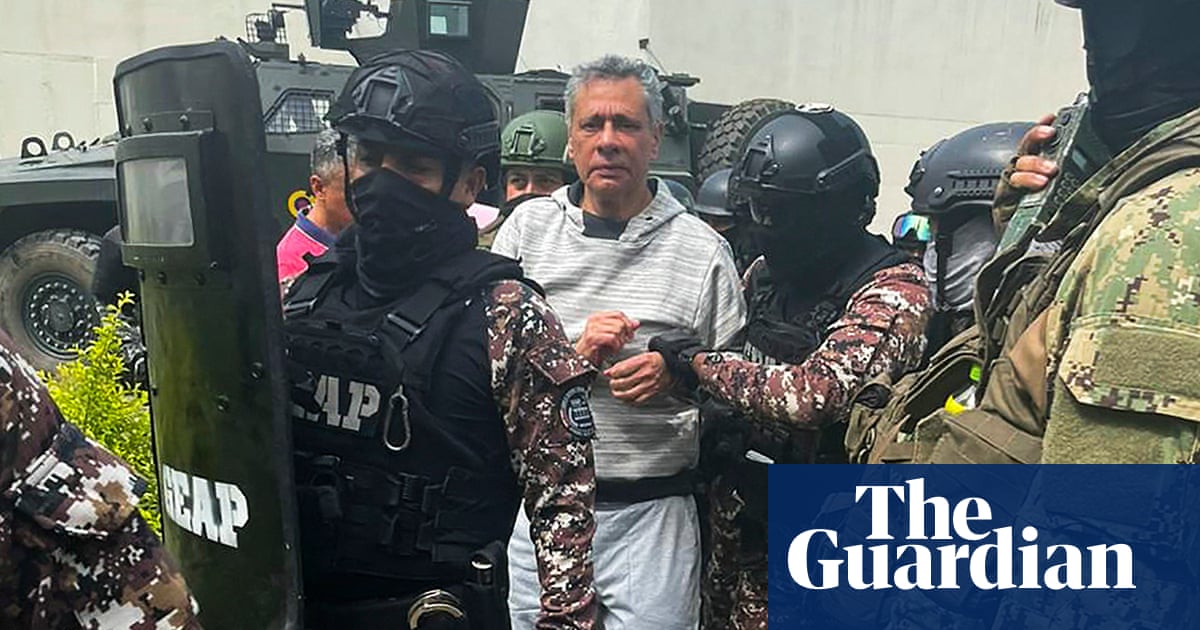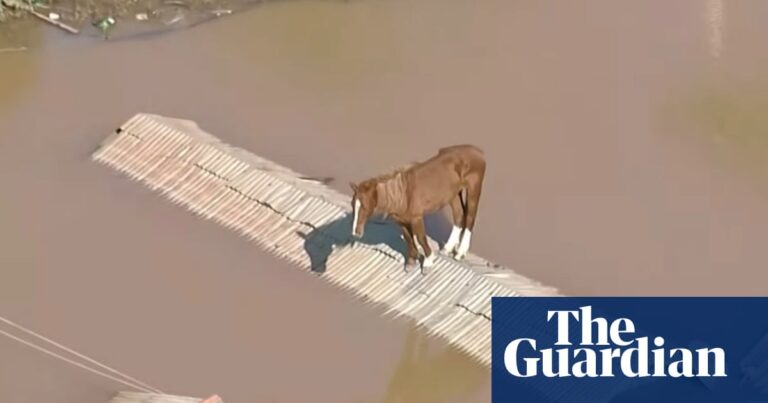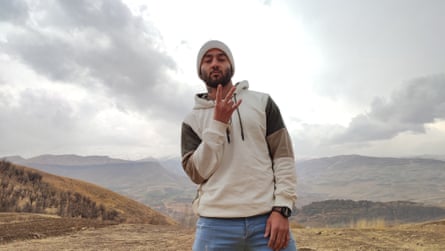
The UN secretary general, António Guterres, has added his voice to a torrent of criticism of Ecuador’s decision to storm the Mexican embassy in Quito in order to arrest the former vice-president Jorge Glas.
“The secretary general is alarmed at the forced entry of Ecuadorian security forces into the premises of the Mexican embassy,” Guterres said through his spokesperson on Sunday, adding that violations of the sanctity of diplomatic and consular property “jeopardise the pursuit of normal international relations”.
The decision by Ecuador’s young president, Daniel Noboa, to order Friday’s raid – portrayed as part of his three-month-old “war on crime” – has prompted an unusually intense outpouring of outrage from across the political spectrum in Latin America.
Dramatic footage of the police assault showed heavily armed officers scaling the building’s outer wall before a senior Mexican diplomat, Roberto Canseco, was wrestled to the ground as Glas was driven away. “This cannot be. This is madness,” Canseco was filmed shouting. “I’m worried, because they might kill him,” a visibly shaken Canseco added of Glas, who had been living at the Mexican embassy since seeking asylum there late last year.
Brazil’s president, Luiz Inácio Lula da Silva, led the criticism, expressing solidarity with his Mexican counterpart, Andrés Manuel López Obrador.
The Brazilian foreign ministry said Ecuador’s move deserved “vehement repudiation” and was a “clear violation of the pan-American convention on diplomatic asylum and the Vienna convention on diplomatic relations”.
Chile’s president, Gabriel Boric, condemned the action as an “unacceptable infringement” of Mexican sovereignty.
The criticism from Caracas was more extravagant, with Venezuela’s strongman leader, Nicolás Maduro, describing the raid as a fascist “act of barbarism of the kind never before seen in Latin America”. Maduro accused Ecuador’s “rightwing, pro-Yankee government” of “brutally violating international law” and “kidnapping” Glas. “Not even during the region’s most terrible dictatorships – such as Augusto Pinochet’s in Chile or Jorge Rafael Videla in Argentina, did such a thing take place,” Venezuela’s foreign ministry claimed.
Nicaragua’s authoritarian government said it would follow Mexico’s lead in cutting ties with Ecuador over Noboa’s “astonishing and despicable act”.
But there was also criticism from the Latin American right, underlining the level of unease over Ecuador’s highly unorthodox move.
The conservative government of Argentina’s president, Javier Milei – which had recently collaborated with Noboa’s war on crime by detaining and expelling the family of one of Ecuador’s most notorious gangsters – said it supported the chorus of regional criticism and demanded the “full observance” of international law.
Uruguay’s conservative government said it “profoundly regretted” Friday’s raid, which was the climax of months of friction between Ecuador and Mexico and their two ideologically incompatible leaders.
Glas, who was vice-president from 2013 until early 2018, had been sheltering in the Mexican mission since December after requesting asylum on the grounds that he was suffering political persecution. The 54-year-old politician – who served under the leftist former president Rafael Correa – has been convicted of corruption on two occasions since 2017 and sentenced to six and then eight years in jail.
Mexico’s decision to shield a man whom Ecuadorian authorities considered a fugitive went down badly with Noboa, who was elected last October after a violence-plagued campaign in which one of the candidates, Fernando Villavicencio, was assassinated.
Relations went from bad to worse last Wednesday when López Obrador, a 70-year-old nationalist, publicly insinuated that something “very strange” had happened during the election that brought Noboa, the 36-year-old scion of one of Ecuador’s richest men, to power.
Ecuador hit back, declaring Mexico’s ambassador in Quito, Raquel Serur, a persona non grata. Then came Friday’s raid, in which black-clad forces stormed the embassy compound with riot shields, riots and ballistic helmets – scenes reminiscent of a drug bust.
“Ecuador is a sovereign nation and we will allow no criminal to go unpunished,” the presidency vowed in a statement that painted the assault as part of a high-profile attack on organised crime that Noboa launched in January after a deadly wave of gang violence brought parts of the country to a standstill.
On Saturday morning, Glas was transferred to a maximum-security prison in the city of Guayaquil that is home to some of Ecuador’s most high-profile criminals. The prison is nicknamed “the Rock”, an allusion to the Californian penitentiary Alcatraz.
Under international law, embassy premises are “inviolable” and “the agents of the receiving state may not enter them, except with the consent of the head of the mission”.
Article 22 of the 1961 Vienna convention on diplomatic relations states: “The premises of the mission, their furnishings and other property thereon and the means of transport of the mission shall be immune from search, requisition, attachment or execution.”
Source: theguardian.com



















